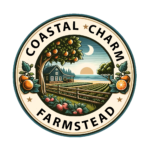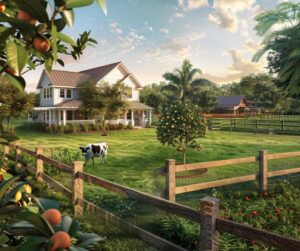Understanding the Difference Between Farmstead and Homestead
What is a Homestead?
A homestead is a residence that is primarily focused on self-sufficiency and sustainability. Homesteaders aim to produce most of their food, energy, and resources on their own land. Here are some key characteristics of a homestead:
Self-Sufficiency: Homesteaders strive to grow their own food, raise animals, and create a sustainable living environment. This often includes gardening, raising chickens, and preserving food.
Lifestyle: Homesteading is more than just a means of production; it’s a lifestyle choice. Homesteaders often emphasize natural living, minimalism, and a deep connection to the land.
Scale: Homesteads can vary in size, from small urban plots to larger rural properties. The focus is on personal and family use rather than commercial production.
Skills: Homesteaders tend to develop a wide range of skills, including gardening, animal husbandry, food preservation, woodworking, and more. The goal is to rely less on external sources and more on their own capabilities.
Community: While homesteading emphasizes self-reliance, many homesteaders also value community connections, sharing resources, and supporting local economies.
What is a Farmstead?
A farmstead, on the other hand, is a piece of land dedicated to agriculture and farming. While farmsteads can also embrace sustainable practices, their primary focus is often on commercial production. Here are some defining features of a farmstead:
Agricultural Production: The primary purpose of a farmstead is to produce crops and livestock for sale. This can include anything from large-scale grain farming to small-scale vegetable and livestock production.
Commercial Focus: Unlike homesteads, which are centered on personal use, farmsteads operate with the goal of generating income. This means a larger scale of production and more emphasis on marketability.
Specialization: Farmsteads often specialize in specific types of crops or livestock. This specialization can lead to a higher level of expertise and efficiency in certain areas of farming.
Equipment and Infrastructure: Farmsteads typically require more specialized equipment and infrastructure, such as barns, silos, tractors, and irrigation systems, to support large-scale production.
Economic Considerations: The financial aspect of farming is a significant factor for farmsteads. This includes managing expenses, maximizing yield, and navigating the challenges of agricultural markets.
Key Differences Between Homesteading and Farmsteading
Purpose and Scale:
Homesteading: Focuses on self-sufficiency and sustainability, often on a smaller scale.
Farmsteading: Aims for commercial agricultural production, typically on a larger scale.
Lifestyle and Values:
Homesteading: Emphasizes a holistic, natural lifestyle with a deep connection to the land.
Farmsteading: Prioritizes efficient production and market-oriented goals.
Economic Goals:
Homesteading: Primarily supports personal and family needs, with any surplus sometimes shared or sold locally.
Farmsteading: Operates as a business with the intent to generate income through the sale of crops and livestock.
Skill Sets:
Homesteading: Involves a wide range of skills for self-reliance, from gardening to food preservation.
Farmsteading: Requires specialized knowledge and skills focused on agricultural production and farm management.
Conclusion
Both homesteading and farmsteading offer fulfilling ways to connect with the land and live more sustainably. Your choice between the two depends on your personal goals, values, and lifestyle preferences. Whether you seek the self-sufficiency and simplicity of a homestead or the commercial focus and agricultural expertise of a farmstead, both paths provide rewarding opportunities to cultivate a deeper relationship with nature and a more self-reliant way of life.
Article written by Christine Moffett
Christine stands out as a distinguished executive and technology innovator, dedicated to fostering unity among global tech leaders. With a successful career in technology, she is now transitioning into a passionate gardener.
Christine’s mission is to share life experiences, gardening lessons learned, and practical tips for achieving balance and well-being. She aims to inspire a culture of gratitude and balance, encouraging individuals to harmoniously blend professional achievements with personal fulfillment.
Join Christine on her journey as she offers insights and strategies for living a more enriched and balanced life.
Connect with Christine on LinkedIn


